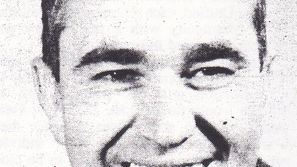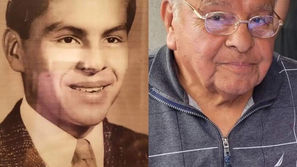From furniture to caskets; kindness carried on
- Bill Coate
- May 12, 2021
- 3 min read

Courtesy of the Madera County Historical Society
R.C. Jay.
Richard C. Jay was a remarkable person. Among his many laudable attributes was his concern for the underprivileged of Madera. It is a well-known fact that it was the plight of a destitute, local woman that took him out of the furniture business and transformed him into a mortician. That same concern for those less fortunate than himself was passed on to his descendants and continues to this very day.
It was in 1893, the year of Madera County’s birth, that Richard Curtis Jay learned about a Madera resident who had died penniless and had been refused burial by the town’s only undertaker. Jay was incensed! Being a furniture dealer and having some skill at woodworking, he proceeded to direct his expertise toward another arena. R.C. Jay promised the family that he would make the woman’s casket.
This he did, and almost overnight he changed his profession. Within a few months Richard C. Jay was Madera’s only undertaker, and in 1899, he became county coroner and public administrator. Within a few years his son, Robert, joined Jay in the business, and under his father’s tutelage, the younger Jay learned what it meant to serve the community. Concern for the poor continued when Robert took the reins.
Fast forward to 1916. A Chinese gentleman had died in the Madera County Hospital. He had no family and apparently no friends in Madera. In addition, he had a poor reputation, especially when it came to the use of opium. It was said of him when he was admitted to the hospital “He liked to look upon the pipe when it was hot.”
When Robert S. Jay was notified of the death, he went to the hospital to perform his duty. What he found was a pitiful situation. The departed Maderan was shriveled up and had huge cracks in his flesh. He had obviously been in considerable pain for some time. However, the physical aspect of the case was the least heartbreaking.
Jay prepared the body for burial and then looked for someone who would accept financial responsibility. He scoured Madera’s Chinatown but could find no one who would pay for the funeral. At every turn he ran into a dead end. It seemed that the entire community had turned its back on the deceased. Scores of reasons were given for not contributing.
“He was not good.”
“He was broke; he had no money.”
“The county can bury him.”
Clearly the departed was friendless — almost.
Robert Seldon Jay accepted the inevitable, and in the tradition of his father prepared to assume the total financial burden. He provided a casket for the man and ordered his grave dug. On the day of the burial, Robert Seldon Jay and his employees were the only ones present.
The casket was made ready for lowering, and as the final remains descended to what would have been their final resting-place, a shout was heard from across the cemetery. A messenger arrived with the news that the man was not friendless after all. It just so happened that he had some relatives in Fresno’s Chinese community, and they, having just heard the news, were gathering funds to pay for the funeral. There was one stipulation, however. The interment had to take place in the Borden Chinese Cemetery.
Jay, of course, had no objection to this and ordered his men to raise the casket. The next day, the nearly forgotten Maderan was buried in Borden, with his newly found friends in attendance. It was an appropriate ending. One human being’s passing from this earth had not gone unnoticed.
That happened almost 100 years ago. Although the records don’t show it, the newspapers preserved the story. The man was buried in that little cemetery on Avenue 12.


























Comments